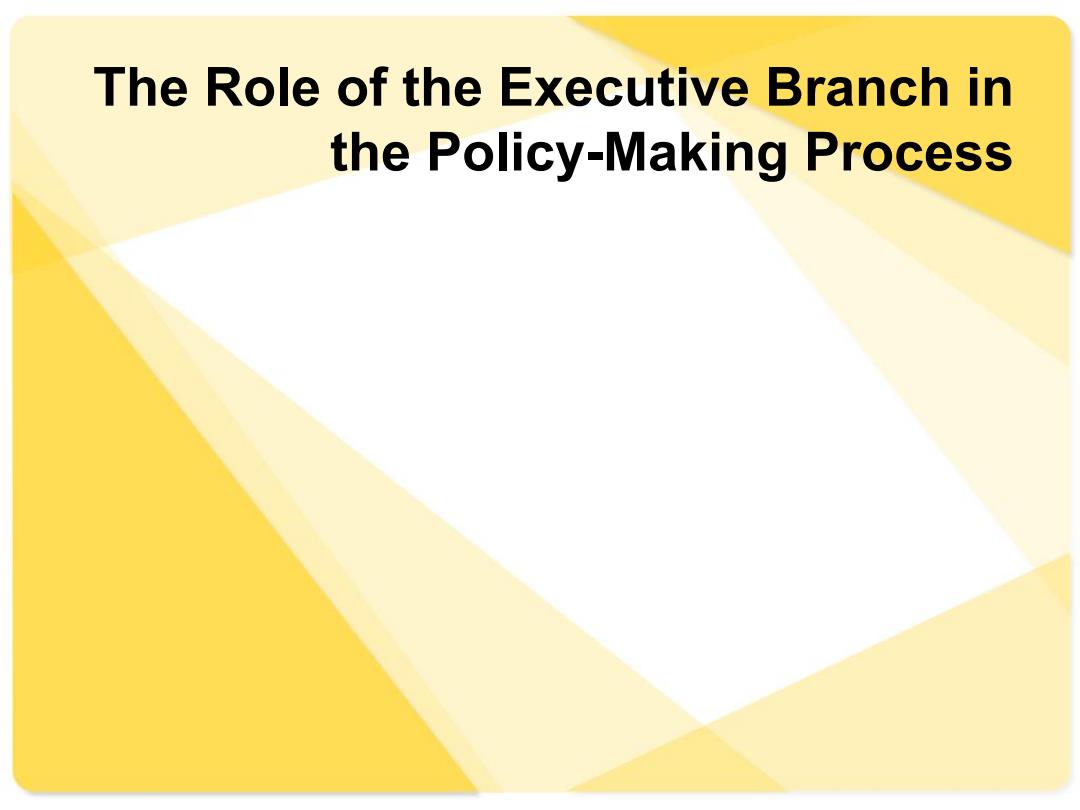
The Role of the Executive Branch in the Policy-Making Process
The Role of the Executive Branch in the Policy-Making Process
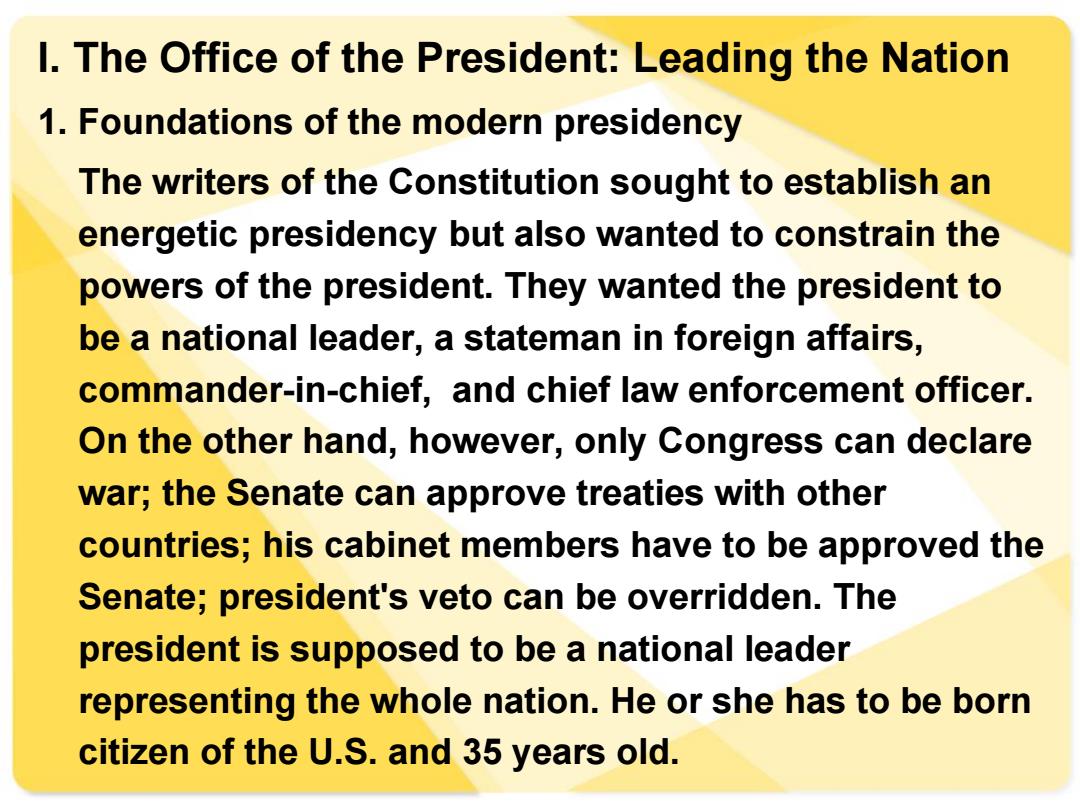
I.The Office of the President:Leading the Nation 1.Foundations of the modern presidency The writers of the Constitution sought to establish an energetic presidency but also wanted to constrain the powers of the president.They wanted the president to be a national leader,a stateman in foreign affairs, commander-in-chief,and chief law enforcement officer. On the other hand,however,only Congress can declare war;the Senate can approve treaties with other countries;his cabinet members have to be approved the Senate;president's veto can be overridden.The president is supposed to be a national leader representing the whole nation.He or she has to be born citizen of the U.S.and 35 years old
I. The Office of the President: Leading the Nation 1. Foundations of the modern presidency The writers of the Constitution sought to establish an energetic presidency but also wanted to constrain the powers of the president. They wanted the president to be a national leader, a stateman in foreign affairs, commander-in-chief, and chief law enforcement officer. On the other hand, however, only Congress can declare war; the Senate can approve treaties with other countries; his cabinet members have to be approved the Senate; president's veto can be overridden. The president is supposed to be a national leader representing the whole nation. He or she has to be born citizen of the U.S. and 35 years old
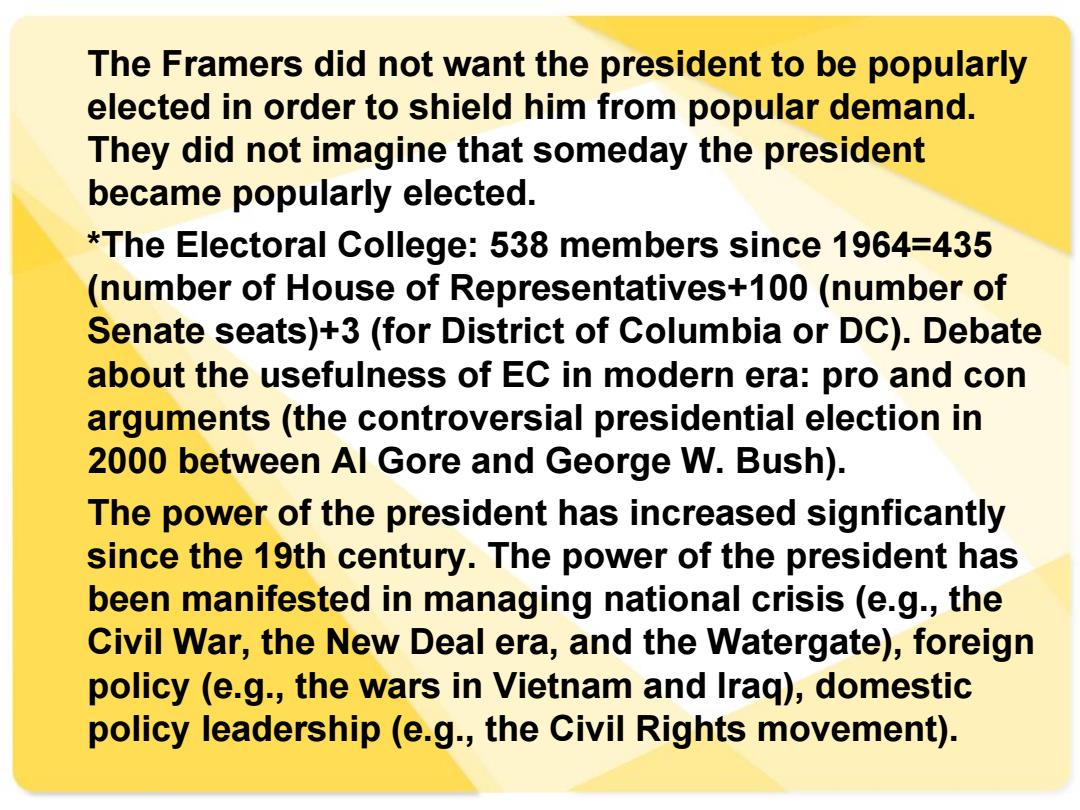
The Framers did not want the president to be popularly elected in order to shield him from popular demand. They did not imagine that someday the president became popularly elected. *The Electoral College:538 members since 1964=435 (number of House of Representatives+100(number of Senate seats)+3(for District of Columbia or DC).Debate about the usefulness of EC in modern era:pro and con arguments(the controversial presidential election in 2000 between Al Gore and George W.Bush). The power of the president has increased signficantly since the 19th century.The power of the president has been manifested in managing national crisis (e.g.,the Civil War,the New Deal era,and the Watergate),foreign policy (e.g.,the wars in Vietnam and Iraq),domestic policy leadership (e.g.,the Civil Rights movement)
The Framers did not want the president to be popularly elected in order to shield him from popular demand. They did not imagine that someday the president became popularly elected. *The Electoral College: 538 members since 1964=435 (number of House of Representatives+100 (number of Senate seats)+3 (for District of Columbia or DC). Debate about the usefulness of EC in modern era: pro and con arguments (the controversial presidential election in 2000 between Al Gore and George W. Bush). The power of the president has increased signficantly since the 19th century. The power of the president has been manifested in managing national crisis (e.g., the Civil War, the New Deal era, and the Watergate), foreign policy (e.g., the wars in Vietnam and Iraq), domestic policy leadership (e.g., the Civil Rights movement)
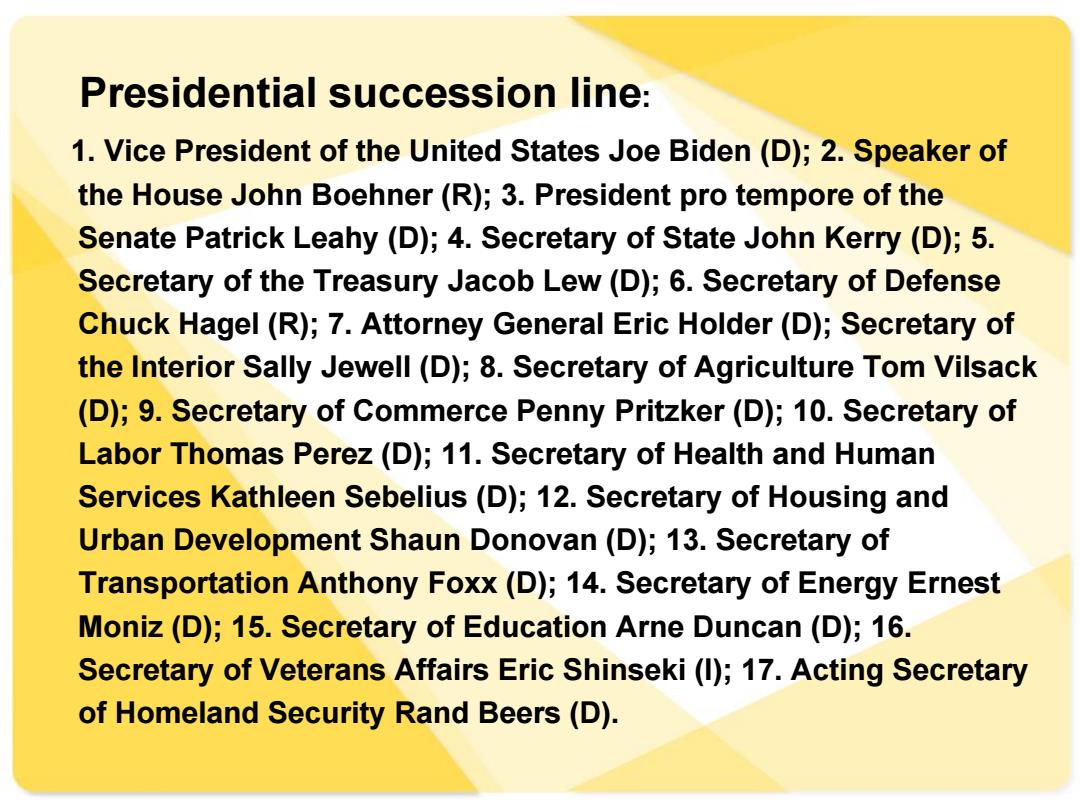
Presidential succession line: 1.Vice President of the United States Joe Biden(D);2.Speaker of the House John Boehner(R);3.President pro tempore of the Senate Patrick Leahy (D);4.Secretary of State John Kerry (D);5. Secretary of the Treasury Jacob Lew(D);6.Secretary of Defense Chuck Hagel(R);7.Attorney General Eric Holder(D);Secretary of the Interior Sally Jewell(D);8.Secretary of Agriculture Tom Vilsack (D);9.Secretary of Commerce Penny Pritzker(D);10.Secretary of Labor Thomas Perez(D);11.Secretary of Health and Human Services Kathleen Sebelius(D);12.Secretary of Housing and Urban Development Shaun Donovan(D);13.Secretary of Transportation Anthony Foxx(D);14.Secretary of Energy Ernest Moniz(D);15.Secretary of Education Arne Duncan(D);16. Secretary of Veterans Affairs Eric Shinseki(I);17.Acting Secretary of Homeland Security Rand Beers(D)
Presidential succession line: 1. Vice President of the United States Joe Biden (D); 2. Speaker of the House John Boehner (R); 3. President pro tempore of the Senate Patrick Leahy (D); 4. Secretary of State John Kerry (D); 5. Secretary of the Treasury Jacob Lew (D); 6. Secretary of Defense Chuck Hagel (R); 7. Attorney General Eric Holder (D); Secretary of the Interior Sally Jewell (D); 8. Secretary of Agriculture Tom Vilsack (D); 9. Secretary of Commerce Penny Pritzker (D); 10. Secretary of Labor Thomas Perez (D); 11. Secretary of Health and Human Services Kathleen Sebelius (D); 12. Secretary of Housing and Urban Development Shaun Donovan (D); 13. Secretary of Transportation Anthony Foxx (D); 14. Secretary of Energy Ernest Moniz (D); 15. Secretary of Education Arne Duncan (D); 16. Secretary of Veterans Affairs Eric Shinseki (I); 17. Acting Secretary of Homeland Security Rand Beers (D)
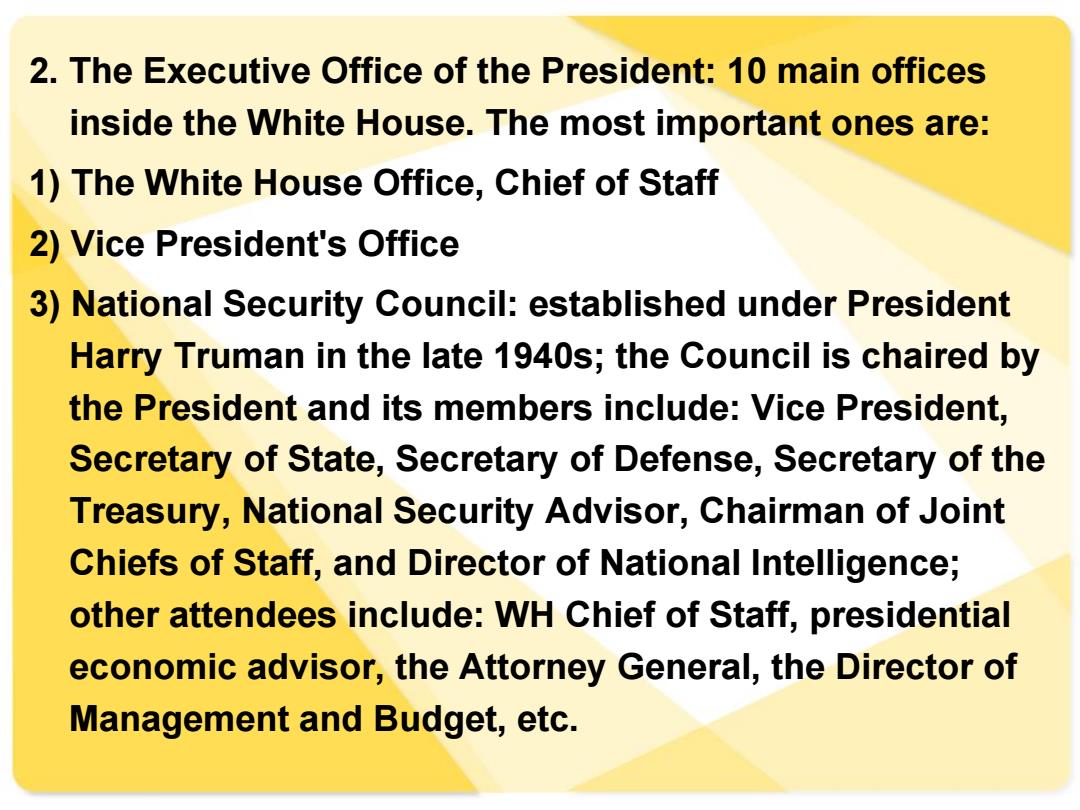
2.The Executive Office of the President:10 main offices inside the White House.The most important ones are: 1)The White House Office,Chief of Staff 2)Vice President's Office 3)National Security Council:established under President Harry Truman in the late 1940s;the Council is chaired by the President and its members include:Vice President, Secretary of State,Secretary of Defense,Secretary of the Treasury,National Security Advisor,Chairman of Joint Chiefs of Staff,and Director of National Intelligence; other attendees include:WH Chief of Staff,presidential economic advisor,the Attorney General,the Director of Management and Budget,etc
2. The Executive Office of the President: 10 main offices inside the White House. The most important ones are: 1) The White House Office, Chief of Staff 2) Vice President's Office 3) National Security Council: established under President Harry Truman in the late 1940s; the Council is chaired by the President and its members include: Vice President, Secretary of State, Secretary of Defense, Secretary of the Treasury, National Security Advisor, Chairman of Joint Chiefs of Staff, and Director of National Intelligence; other attendees include: WH Chief of Staff, presidential economic advisor, the Attorney General, the Director of Management and Budget, etc